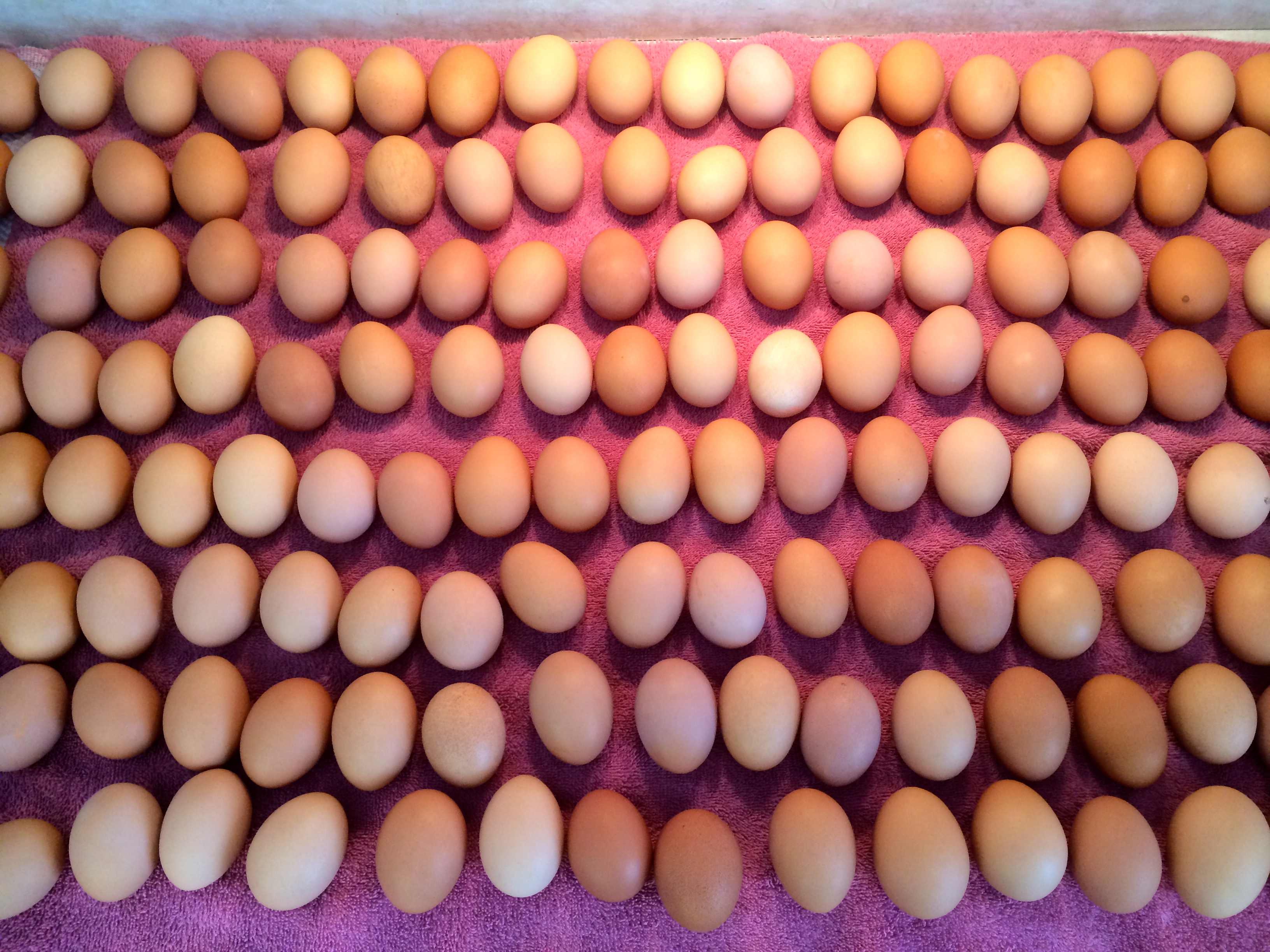We hear the phrase ‘The Birds and the Bees,’ and automatically roll our eyes. Memories drift back to high school sex ed classes, or embarrassing conversations with a well-meaning parent. I still remember an excruciating talk with my father who, during a long drive (presumably to avoid eye-contact), spoke in graphic detail about puberty and hormones. When he was done, I retreated into the psychedelic world of Super Mario Brothers, populated with mushroom people who were gratefully devoid of testicles or ovaries.

Free-Range eggs. This photo was taken in mid-February, when our 900 hens laid about 550 eggs for the day.
Sure, we call this talk ‘the birds and the bees,’ yet how often do we actually discuss the mating habits of avians or insects? Perhaps we’re missing a broader opportunity here: If we’re going to freak out generations of twelve year olds, we might as well teach them how the topic relates to our food system.
You already know a lot more about chickens and eggs than you might think. Pop Quiz: When do birds fly south for the winter? When do we hardly see any birds at all? When do birds build their nests? When do you see birds just hanging out, not doing much of anything?
If you answered ‘Fall, Winter, Spring, Summer’ then go to the head of the class. If not, well… I’ve got an aunt who wants to discuss hot flashes with you.
Nature is cyclical. The earth has a northern and a southern hemisphere, each with its own seasons. Birds fly north in the spring because it’s warm, and there’s lots of food. They find a mate, fertilize their eggs, and spend a month incubating and hatching their chicks. Can you imagine a robin making a nest in Wisconsin in January, hatching her eggs in a blizzard? Of course not. Even a bird-brain has more sense than that.
And this is where farming comes in. Chickens follow the same seasonal cycles as their fellow birds. The big difference, however, is over the course of many centuries farmers bred and selected hens for certain traits. Year-round hardiness. Egg production. Thriftiness. By doing this, the chickens were gradually removed from the seasonal cycle. These days, with automated confinement poultry houses, the entire burden is on farmers to take care of the chickens, no longer Mother Nature.
It’s by remembering that eggs are laid for reproduction—not for omelettes or Egg McMuffins—that we can better understand why or why not a hen might be laying. As with most things, the answers always lead back to nature.
Why Don’t Chickens Lay Eggs In The Winter?
1) Not enough light Chickens are very sensitive to the length of daylight. Why is this? It’s their internal cue that the days are getting longer, and hence warmer. Remember, chickens lay eggs with the intention of hatching chicks (reproduction). How will a mother hen incubate her eggs on a zero degree night? How will her chicks survive a snow storm? Long days (16 hours of light is best) suggest safe conditions to a hen. If your birds aren’t laying, chances are you need to put a light inside your coop.
2) Not Enough Water Water freezes in the winter, and eggs are comprised mostly of H2O. If a hen doesn’t have constant access to fresh water all day, she’ll quickly become dehydrated and stop laying. Again—move aside Mother Nature, more chores for the farmer!
3) Inadequate Nutrition Hens need lots of calories to produce eggs, especially in the winter when extra forage (insects, clover, etc.) is scare or non-existent. Productive birds require 1/4 pound of 17% protein feed each day, as well as supplemental calcium and granite grit to aid digestion and egg shell production. Remember, it takes 2 pounds of grain to produce 1 pound of gain from a chicken. Where will they find that food in the winter unless the farmer brings it to them?
4) Molting About once a year, hens naturally shed their feathers, a process known as ‘molting’. When they do this, they stop laying for roughly a month as their feathers regrow. If you’re selling eggs for a year-round market, it’s best to stagger the ages of your flock (introduce a new flock every 6 months) so you’ve always got a steady supply.
✹ ✹ ✹
As you can see, most times when a hen stops laying, it’s because of natural reasons. Despite consumer demand for year-round productivity, chickens will never be egg laying robots. I’d even argue that eggs aren’t ‘supposed’ to be laid in the winter; that it’s really an agricultural trick developed over many centuries. This is why nearly all of America’s eggs come from confinement houses, where food, light, and temperature is constantly regulated. Raising hens free-range on pasture—as we do on our farm—comes with many additional challenges.
Each autumn, as my hens reliably slow down and I quickly sell out of eggs at farmers’ market, well-meaning customers always comment, “Out of eggs already? You need to get a bigger flock of chickens!”
I shake my head, politely disagreeing. “When it comes to chickens,” I reply, “it needs to be June all year round.”
After 30 years of keeping a flock, I’m pretty sure my hens would enjoy that, too.
Check out my books!













Leave a Reply